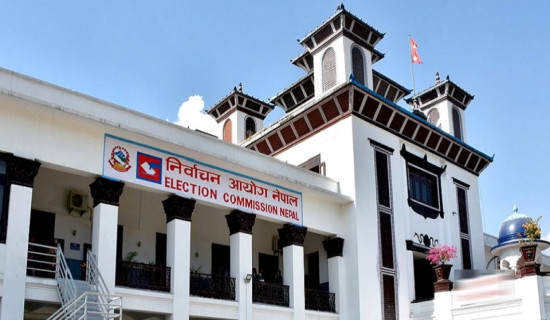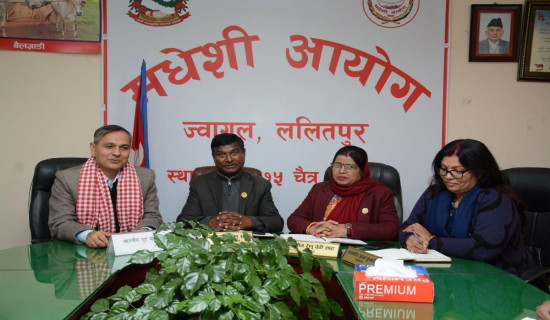- Thursday, 8 January 2026
Support Startups For Business Growth
The modern day world is full of rapidly developing technology and many solutions brought by entrepreneurship. Startups like Tootle, Pathao, Honey Guide, Khaanpin, Khalti and Voxcrow have addressed issues such as travel, ride sharing, food and telecommunications, among others. The digital evolution has generated great hopes in Nepali business community in recent times. Nepal is expecting tremendous growth, a stable government, emerging technologies and proactive leaders with recent fresh mandate from general election. This will certainly benefit youths who are seeking to succeed in the native soil with innovations. Most startup niches are converging toward pro-tech or semi-tech bias. We have a lot of problems and startups should focus on different dimensions to reduce failure rates.
Startup culture is growing rapidly, which calls for creative solutions using thinking that is 'out-of-the-box' to handle star innovators, startups and entrepreneurship. We as a whole nation must actively engage in finding the right talent to solve common problems faced by Nepali startups. Entrepreneurs are made out of tough challenges and class innovations. New founders of such ventures should plan to address many needs and issues of the society faced by the common man through their excellent leadership and solution-oriented startups that contribute to the economy. That is why diversity and talent promotion along with political power play an important role in finding suitable solutions to major problems in any nation. Let us discuss some of the ways to solve the problems that our startup fraternity is facing.
Recognition
Nepal should identify the need to develop innovation and incubation centres in scales to foster innovation and entrepreneurial mindset in its large student community through academic institutions. The growing number of incubators and the continued inclination of young executives towards starting their own ventures is also boosting the entrepreneurship and early stage startup ecosystem in Nepal. Fewer efforts from the private sector to create innovation and incubation centres has also fueled their efforts for innovative startup businesses to emerge as scalable and sustainable enterprises.
It is a general observation that a significant number of startups' founders are young graduates from mostly information technology background and premier engineering colleges or have worked for companies with paid up capital mostly less than Rs. 10 million. It is the task of policy makers to help in order to heal the gap of the right mix of passion, expertise and approach among local entrepreneurs, along with an ambitious youth ready to take risks, putting the early-stage startup ecosystem in an advantageous position to capitalise on opportunities in a rapidly emerging market.
Government of Nepal should facilitate the growth of early stage startups through implementation of progressive policies and creation of relevant infrastructure. Governments at all levels should launch startup specific initiatives. They should encourage collaborations between the well-established corporates, which lack innovation capabilities and competencies, and nimble early-stage startups that lack cash for growth as well as networks for market access with lucrative rewards. Financing and money lending is a tough deal in our market since banks don't play by government books of subsidies and schemes to support young entrepreneurs. More regulations and provisions should be made to provide access to easy financing for startups.
Nepali startups are facing a severe funding crunch. The access and availability of venture capitalists and angel investors is rare. The banks have provision for project financing to cater to the growing demand for a specialised approach to project financing either singly or through syndication of banks, especially for projects under hydro, cement, road, large hotel and hospital, etc. These sectors are merely the area of startup for our young generations. Adequate finance is required for rapid growth of the startup ecosystem and hence the role of venture capital investors and angel investors is crucial. Venture capital investors need to have an adequate risk management framework in place at the portfolio level, as this is a critical part of all successful venture capital operations. The government should take steps to help them out to ensure safety of investment.
Education, reskilling and skill upgradation of the Nepali workforce is important for transitioning beyond existing capabilities and achieving demographic dividend. It needs to be understood that apart from the domestic policy environment, the global environment and technological advancement are also changing and therefore it is necessary that Nepal should be ready for this revolution. Nepal should focus on data protection services and regulations. The now-generation people are investing in technology and data generation, and its protection is a serious concern for its clientele. Data centres must be open for all innovators at handy cost. A steady balance needs to be struck between privacy and innovation.
Entrepreneurship
In addition to policy-level decisions promoting entrepreneurship, the FNCCI, CNI, NCC and FNCSI like corporate community also has a responsibility to nurture entrepreneurship and create synergy to build impactful technology solutions and sustainable and resource-efficient growth. They must welcome the new buds in the market and help them blossom. Antarprerana Pvt. Ltd. is taking the lead to help startups foster and now is the time for the corporate community to take steps.
The logistic aspect is tough for any sort of e-commerce in Nepal. Big giants like Daraz, Sastodeal, among others, are even facing the problem of logistics. Better physical and digital connectivity will unlock the possibility of business expansion. Government should ensure access of startups to the internet and roads. We can reshape the postal services to create an effective ecommerce logistic network.
(The author is an independent researcher and is involved with various startups.)
















